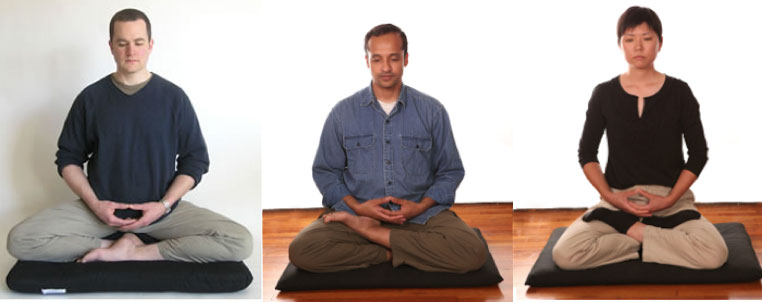Lately, have you been experiencing a lack of focus at work, feeling sluggish and unable to perform well? Then why not consider meditation to achieve a state of calmness and relaxation in both mind and body?
Meditation is not just about sitting still and breathing; it’s a process of training the mind to become aware and overcome desires and attachments. By focusing on your breath or a specific object, meditation helps develop mindfulness and reduce mental distractions, paving the way for a deeper practice towards inner freedom and peace.
In this article, LotusBuddhas will reveal the “most effective” meditation techniques for beginners. Join LotusBuddhas to learn more!
Definition of Meditation

Meditation, as understood in Buddhism, is the integration of body and mind in the present moment to observe and understand objects, phenomena, and thoughts[1]. It aims to quiet the mind, setting aside all distractions to gain a clear and insightful awareness of oneself and the surrounding world.
From a scientific and biological perspective, meditation is a method of mental training that induces positive changes in the brain and body. Practicing meditation can alter brain activity, especially in areas related to attention, self-awareness, and emotion regulation. Research indicates that meditation can increase the gray matter density in certain brain regions, enhancing skills like focus and awareness.
Biologically, meditation helps reduce stress by lowering the production of the cortisol hormone, which in turn decreases inflammation and boosts immune function. It is also associated with reduced heart rate and blood pressure, contributing to better cardiovascular health. These changes not only foster a sense of peace and relaxation but also benefit the body’s overall health.
Essentials for an Effective Meditation Session
When embarking on a meditation journey to boost mental and physical health, establishing a suitable space and routine is crucial[2]. LotusBuddhas.com suggests selecting a quiet area away from the disruptions of electronic devices and noisy environments, as well as avoiding distractions from people around you. This setting enhances focus and tranquility during each meditation session.
The ideal duration for each meditation session is about 10 to 15 minutes. You can flexibly fit this into any part of your day, as long as it aligns with your personal schedule. Following advice from teacher Minh Niem, it’s not essential to rely heavily on elements like music, incense, or other supportive tools. If you sit comfortably, focus on your breath, and remain aware of your presence in the moment (mindfulness meditation), you’ll notice positive shifts in your mood and overall health.
Meditation Guide for Beginners

Meditation Posture
In principle, any posture in which you feel comfortable is adequate for meditation. However, you can also refer to the traditional Buddhist meditation posture known as the full lotus position.
- Choose a quiet place: First, find a peaceful and comfortable spot to sit. You may want to place a mat or a cushion on the floor.
- Sit down: Position your left foot on your right thigh. Beginners who find this challenging can simply sit with their legs comfortably crossed.
- Place your right foot on top: Gently lift your right foot and place it on your left thigh. Ensure that the sole faces upward and both knees touch the ground for balance.
- Maintain a straight posture: Keep your back straight yet relaxed. This aids balance and supports deep breathing.
- Position your hands comfortably: Rest your hands on your thighs or knees, palms facing up. Alternatively, you can place one hand on top of the other with the thumbs lightly touching, forming a circle.
Remember, mastering the full lotus position takes practice. Start with short sessions and gradually increase your meditation time as you become more comfortable with the posture.
Breathing Technique in Meditation
Focus on your breath: Close your eyes gently and concentrate on your breathing, noticing the air moving in and out of your body. Breathing in meditation is not just a natural process but also a crucial means to enhance mindfulness and relaxation. Here are detailed instructions on how to breathe during meditation:
- Start in a comfortable sitting position: Sit in the full lotus or any comfortable pose, keeping your back straight but not stiff.
- Close your eyes gently: This helps you focus better on your breathing and minimizes external distractions.
- Pay attention to your breath: Focus on your breathing. Feel the air flowing through your nostrils, filling your lungs, and then leaving your body.
- Breathe naturally and steadily: Inhale deeply through your nose, hold the breath as it feels natural, and exhale through the nose. Do not try to control or alter your breathing rhythm; let it flow naturally.
- Focus on the sensation: As you breathe, notice the sensation of air moving through your nostrils, the expansion of your chest and abdomen. As you exhale, feel the relaxation in your body.
- Avoid judgment or tension: If your mind wanders, gently redirect your focus back to your breath without judging yourself for losing concentration.
- Maintain mindfulness: Stay mindful of your breath throughout the meditation to cultivate a state of peaceful awareness and relaxation.
Breathing in meditation is a vital part of the practice, promoting comprehensive relaxation and mental health improvement.
Concluding Your Meditation Session
Gently transitioning back to the external world is essential after your meditation session. Here’s how you can seamlessly complete your meditation practice:
- Slowly stand up and open your eyes: Gradually open your eyes and rise, allowing your body and mind to adjust after the period of stillness.
- Perform calf muscle stretches: Sitting for extended periods might make your legs numb or stiff. Gently stretching your calf muscles can improve blood circulation and prevent issues like cramps or stiffness. Consider exercises like extending your legs, rotating your ankles, or walking around the room.
- Smile and think positively: As you prepare to resume your activities, smile gently. This not only makes you feel more comfortable and positive but also carries an optimistic spirit into your next daily tasks.
- Prepare for the next activity: Take a moment to plan your upcoming tasks, carrying the calm and positive energy from your meditation into your next actions.
These steps help you conclude your meditation smoothly and naturally, supporting an effortless transition back to daily life with renewed energy and focus.
Types of Meditation for Beginners

For individuals new to meditation, it is essential to select an appropriate technique that aligns with their personal preferences, goals and existing knowledge[3]. Although numerous meditation practices exist, the following types are particularly well-suited for beginners due to their simplicity, accessibility and proven effectiveness:
- Mindfulness meditation: Rooted in Buddhist traditions, mindfulness meditation encourages practitioners to develop nonjudgmental awareness of their thoughts, emotions, and bodily sensations as they arise and pass away in the present moment. By cultivating an attitude of curiosity, acceptance, and compassion, beginners can gain greater self-awareness and equanimity. This practice can be easily adapted to daily activities, such as mindful eating, walking, or even listening to music.
- Samatha meditation: This form of meditation involves focusing one’s attention on a specific object, such as the breath, a mantra, or a visual image. Concentration meditation aims to stabilize the mind, minimize distractions, and promote inner peace. For beginners, focusing on the breath is an accessible and effective starting point, as it is a natural and ever-present object of focus.
- Body scan meditation: In this technique, practitioners systematically direct their attention to different parts of the body, noting any sensations, tensions, or discomfort they may experience. The body scan helps to develop bodily awareness, relaxation, and the ability to release tension. Beginners often find this practice particularly accessible, as it provides a clear and structured method for cultivating mindfulness.
- Loving-kindness meditation (Metta): This practice involves the cultivation of positive emotions, such as love, compassion, and goodwill, towards oneself and others. Practitioners typically repeat a series of phrases, silently or aloud, while visualizing the recipients of their well-wishes. Loving-kindness meditation can be particularly beneficial for beginners who struggle with self-criticism or interpersonal difficulties, as it fosters emotional resilience and social connectedness.
- Guided meditation: For those who find it challenging to meditate independently, guided meditation offers a structured and supportive introduction to the practice. Led by an experienced teacher, either in-person or through recorded audio or video, guided meditation sessions provide step-by-step instructions for various techniques, ensuring that beginners remain focused and engaged throughout the practice.
When beginning to explore meditation, you should approach the practice with patience, consistency, and an open mind. Experimenting with different techniques can help you identify the most suitable method based on your needs and preferences. As proficiency develops, you may choose to incorporate additional practices or explore more advanced techniques to deepen your meditation experience.






